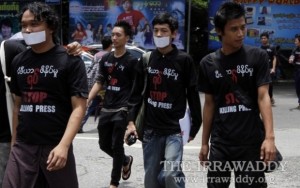Burma Ends Pre-Publication Check, Not Censorship
By Burma Partnership • August 27, 2012 Prior submission of print media content that had been imposed for the last 48 years ended when the Press Scrutiny and Registration Board (PSRD) introduced its post-publication checks that came effective on 20 August. Journals and newspapers no longer need to submit their publication beforehand but afterward. However, the 1962 Printers and Publishers Registration Act and the 2004 Electronics Transaction Act that have been repeatedly used to jail journalists and activists are still in place. Journals have been suspended and could still be suspended at any time. Furthermore, journalists and reporters have to abide by the newly introduced 16-point ethical guidelines that prohibit them from criticizing the state.
Prior submission of print media content that had been imposed for the last 48 years ended when the Press Scrutiny and Registration Board (PSRD) introduced its post-publication checks that came effective on 20 August. Journals and newspapers no longer need to submit their publication beforehand but afterward. However, the 1962 Printers and Publishers Registration Act and the 2004 Electronics Transaction Act that have been repeatedly used to jail journalists and activists are still in place. Journals have been suspended and could still be suspended at any time. Furthermore, journalists and reporters have to abide by the newly introduced 16-point ethical guidelines that prohibit them from criticizing the state.
These repressive laws as well as the arbitrary regulations and code of conduct imposed on media and journalists remain a great threat to media freedom. The PSRD still monitors the content of publications and any newspaper or journal risks prosecution if any of their content breaks the guidelines. This has the very real potential of resulting in greater self-censorship.
Journalists are calling for an immediate abolishment of all the repressive laws. Nyein Nyein Naing, Executive Editor of 7 Days News weekly paper, stated there will not be genuine press freedom until the 1962 Printers and Publishers Registration Act is amended.
On 21 August, authorities in Rangoon denied permission to protest in front of the Township Hall as requested by a group of journalists, claiming it would disturb the traffic and public. While having to work under great restrictions and while the world is wrongfully celebrating the end of censorship in Burma, journalists are being stopped from taking action promoting greater media freedom.
Dr. Than Htut Aung, Chairman and CEO of the Eleven Media Group, noted that this relaxation on print media only brings changes in procedure. He explained that the rules are still in place and they still cannot publish what they want to write freely. The Voice Weekly, a Rangoon-based weekly news journal, was recently sued by the Ministry of Mining for publishing an article that exposed information about corruption in six ministries. The journal is still facing charges. This confirms the sad fact that criticism of state is still not tolerated.
On 10 August, the Ministry of Information announced the formation of a press council that was heavily criticized by journalists. The criticism is based on the council tasks, such as “to supervise the expressions that are detrimental to the interest of the people, the dignity of the state and national sovereignty; and to compile and prescribe a code of ethics for members of the press” that could be used to put restriction on the media. Article 19, a freedom of expression NGO, also expressed concerns about the exclusion of journalists and other media actors from the council’s forming process.
Everyone showed excitement as the story about the “termination of censorship” in Burma started to spread. Sadly the focus of coverage perpetuated the regimes goals; an incorrect emphasis on total change and a weak or non-existent emphasis of the new and existing censorships regulations. Many non-local media quickly covered the story but as usual they captured only the parts that illustrate “reform” in the country. There have been positive developments in terms of media freedom including this last move that ended pre-publication checking of print media, yet censorship has not come close to ending and challenges and risks remain high for the media in exercising its freedom. To prove their genuine commitment to media reform, much more remains to be accomplished by the regime rather than setting up deceitful charades that Western governments want to see. All the repressive laws and government bodies such as the PSRD that are threatening media freedom should be abolished and new media laws that serve not the state but the people should be introduced.
Tags: Burma Partnership, Censorship, Freedom of Expression, Journalists, Press Scrutiny and Registration DivisionThis post is in: Blog
Related PostsBurma Partnership Celebrates Continuing Regional Solidarity for Burma and Embraces the Work Ahead for Progressive Voice
Burma Army Displays Blatant Disregard for 21st Century Panglong Peace Process
Ann Din Coal Power Plant: Local Movement and Action to Preserve and Protect Natural Resources and Land: Mon IDP Report Case Study #4
Latest Human Rights Abuse Case Demonstrates Urgent Need to Reform the Myanmar National Human Rights Commission
Human Rights Far From Guaranteed as US Sanctions on Burma Are Removed









 All posts
All posts